2014 | Berlinale Talents
Finding Delight in Storytelling
The Berlinale talent initiative is heading into its twelfth year, with a new name and new logo. We spoke to programme manager Matthijs Wouter Knol and project manager Christine Tröstrum about their motivations for the relaunch, about new programme content and the art of storytelling.
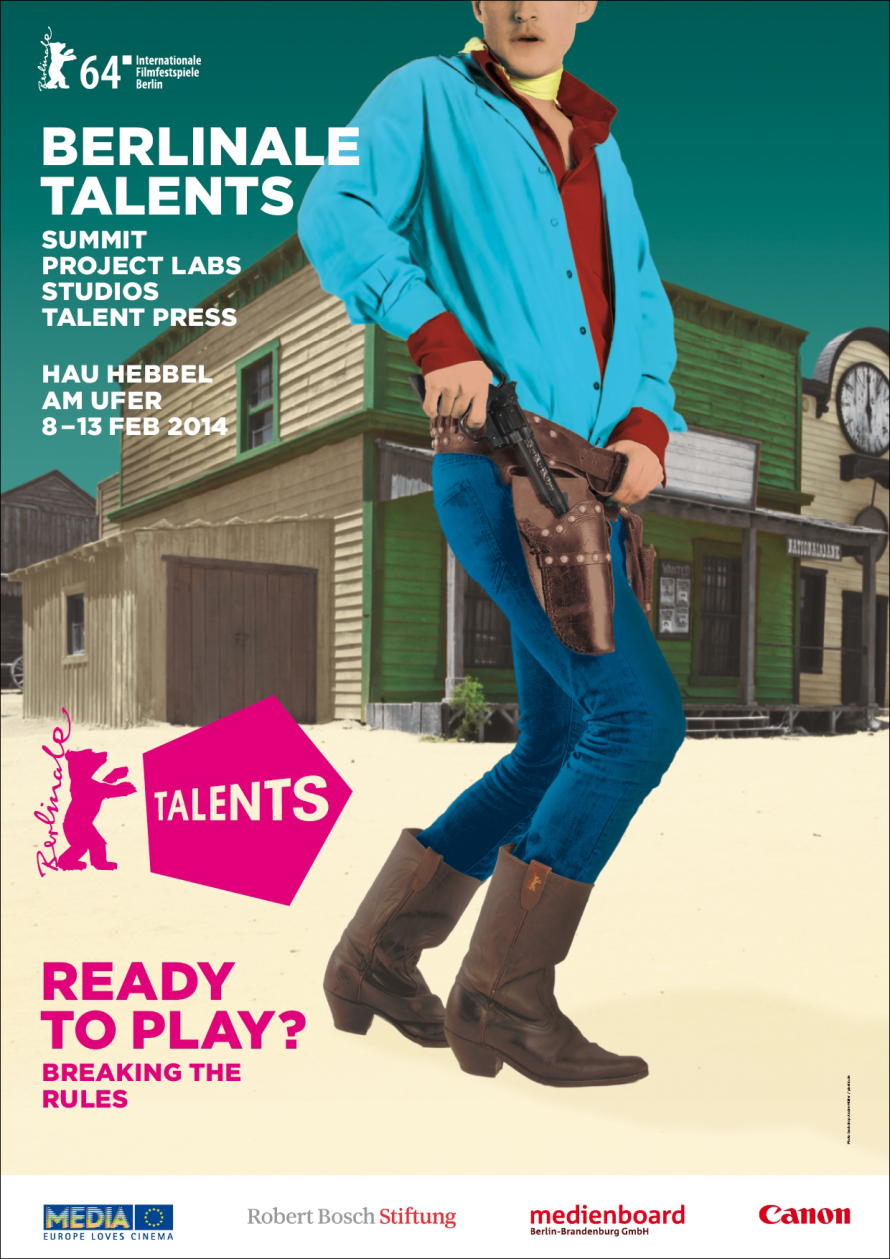
After eleven years, the former Berlinale Talent Campus has been given a new name and a new face. Why?
Matthijs Wouter Knol: When the Campus began in 2003, it was a unique initiative, a meeting point for up-and-coming filmmakers, and it developed consistently in the following years. The Studios and Project Labs grew organically from the primarily lecture-like structure as we responded to the changing needs of the filmmakers. Our programme became more professional without the name reflecting that change. The term "campus" is usually associated with students, but our programme doesn't represent anything decidedly academic or classroom-oriented anymore. Instead it is increasingly concentrated on the practical needs of ambitious professionals. The core of our Berlinale initiative is that we invite 300 promising filmmakers from around the world to Berlin to discuss and develop their projects and ideas. The Talents of the Berlinale meet here, so why not call the whole thing exactly that: Berlinale Talents.
Christine Tröstrum: What clearly sets us apart from the programme sections of the Berlinale is that instead of selecting single films, we select filmographies, people who have realised promising projects and who are at a point in their career where we think they will profit from participation. We want to encourage them to meet each other, to collaborate on projects, to network among themselves and other Berlinale guests. We foster film careers, if you will, and the renaming into Berlinale Talents is meant to make that more clear than it was previously the case.
Does that mean that networking is more important than it was before?
MWK: Not necessarily. We address a group of talented people who work creatively in film, but who aren't yet very networked. And the networking aspect of Berlinale Talents, where 300 aspiring filmmakers and Berlinale guests converge, is automatically quite raw and hasn't been intentionally changed throughout the course of the restructuring. It's about creative people and how we as the Berlinale can continue to support them.
CT: Last year during our cooperation with Canon, the idea of creating individual, professional portraits of all Talents, and making them visible everywhere, was born. It was an important step towards the visualisation of our sharper profile focus: Look, these are our 300 Berlinale Talents! This is where you can discover talented creatives from various cinematic disciplines.
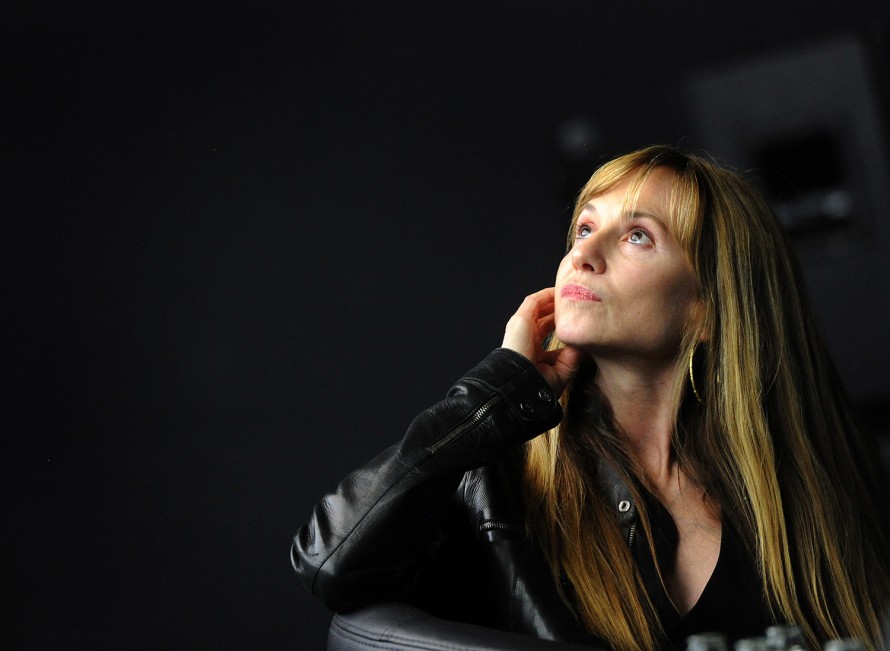
2013 Holly Hunter gave insights into her collaboration with renowned directors
Away from the impression that the participants are students, and closer to their clear position as a new generation of professionals.
MWK: Exactly, because after twelve years, one of the most important aspects of our initiative is still this: a level playing field. Not just for the Talents amongst each other, but also for their interaction with the experts, who meet with them at eye level. There are differences in the level of experience, naturally, but we're more interested in an exchange on a professional basis, not in a teacher-student relationship.
How are the five international offshoots of Berlinale Talents in Guadalajara, Buenos Aires, Durban, Sarajevo and Tokyo integrating the changes - will you be cooperating more closely now?
CT: With regards to content, a closer relationship than in previous years is hardly possible. The international editions are of course independently run, that's always been important to us. But as far as content goes we've cooperated closely from the beginning, supported and inspired each other mutually, and maintained the brand name together. It's just that this shared brand wasn't often communicated outwardly, not least due to the fact that the public image for each edition was an independent graphic creation. From now on, the new common logo will help make it more visible that all six editions grew from one initiative, with common goals, concepts and ideas. Drawing that connection was important to us.
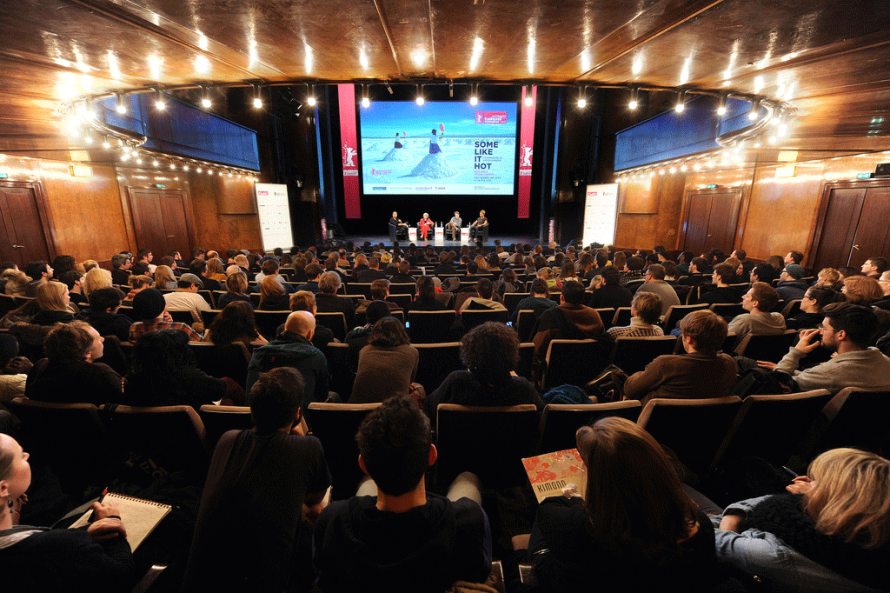
Panel discussion at Berlinale Talents’ main venue HAU Hebbel am Ufer theatre (HAU 1)
Berlinale Talents is divided into four areas: Summit, Studios, Project Labs and Talent Press. What distinguishes each element?
MWK: The Summit is the Berlinale Talents public programme that takes place on all stages of the HAU Hebbel am Ufer theatre. It's made up of Master Classes and Panel Discussions with experts and guests that are either at the Berlinale with a film, or who come exclusively for Berlinale Talents. Besides masters of international film art and experienced professionals, these also include alumni, former Berlinale Talents. During detailed discussions, all of them can introduce their projects, report on their experiences and give the audience the opportunity for an intense exchange. The Summit is open to everyone - from paying audiences, to accredited Berlinale visitors, to the 300 Talents. That's what sets it apart from the Studios, Project Labs and Talent Press, whose participants are specifically selected and to which the Talents apply beforehand.
CT: The Talents apply to the four Project Labs (Talent Project Market, Doc Station, Script Station and Short Film Station) with a film "in development". We select 40 creatives with their projects beforehand and offer them targeted programmes during the Berlinale Talents week. For example, the Talent Project Market is part of the Berlinale Co-Production Market, where the director or producer can present a project to international financiers. The participants in the Short Film, Doc and Script Stations get high-quality feedback on their developed work by experts, and present those projects to international film industry representatives by the end of the week - on Project Presentation Day.
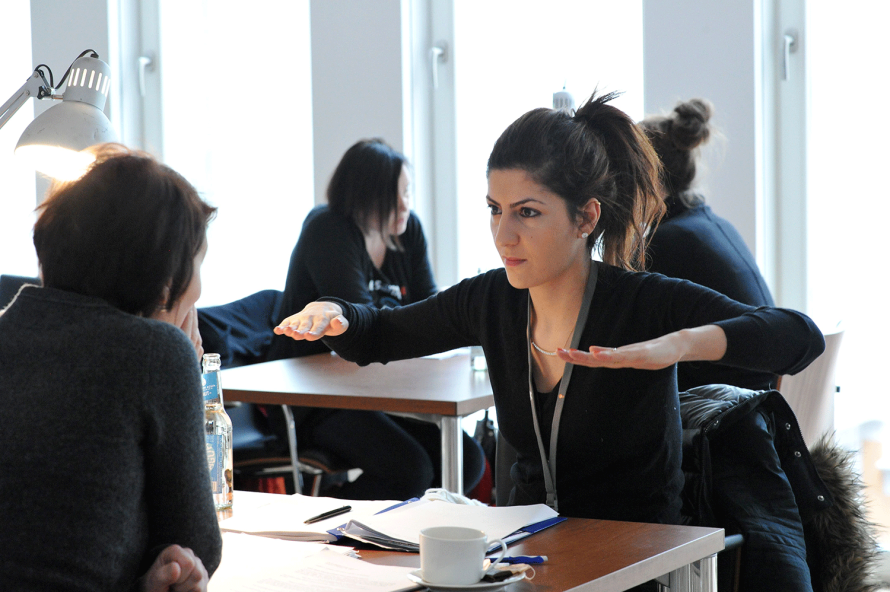
One-on-one meeting with experts during the Project Presentation Day 2013
The selected Talents can also apply specifically for the six Studios (Post-Production Studio, Editing Studio, Sound Studio, Production Design Studio, Distribution Studio and Acting Studio), where special experts function as mentors, accompanying the participants in practical exercises that go far beyond the usual workshop level. The Studios also end in a short presentation that gives the other Talents and guests a look at those participants' content.
Talent Press is one of our oldest workshop programmes, where we offer aspiring film critics the opportunity to write reviews under A-festival conditions, to exchange ideas with experienced colleagues and make new contacts. A printed "best of" magazine with a selection of those reviews is released at the end of the week, also available online at www.talentpress.org.
For the first time last year, you showed alumni films that had also received an invitation to the Berlinale programme. Will alumni continue to be a part of the Talents programme?
CT: Definitely. Around 50 former Talents, with their films, are invited to the official Berlinale programme annually. So our Talents consistently build successfully on the content impulses and profitable contacts they gain here. That's another thing we want to make more transparent, and that's why we show selected alumni films. For example, we opened the Campus 2013 with La Plaga (The Plague, Spain 2013, Berlinale Forum 2013) by Neus Ballús, which went on to screen at festivals worldwide and was nominated as the European Discovery of the Year at the European Film Award, among other distinctions. We also showed Youth (Israel, Germany 2013, Berlinale Panorama 2013) by Tom Shoval, which found a German producer at the Campus and will be released in German cinemas in late January 2014, backed in part by the Medienboard Berlin-Brandenburg. The Project Labs are also very successful: From the Doc and Script Stations alone, several projects we selected have won many awards – from the Deutsche Filmpreis to the Golden Dove in Leipzig.
MWK: It's especially exciting for the "current" Talents to meet the former ones and ask them about their experiences. It's a substantial incentive – seeing that the projects they're working on have real chances to be screened at the Berlinale in years to come.
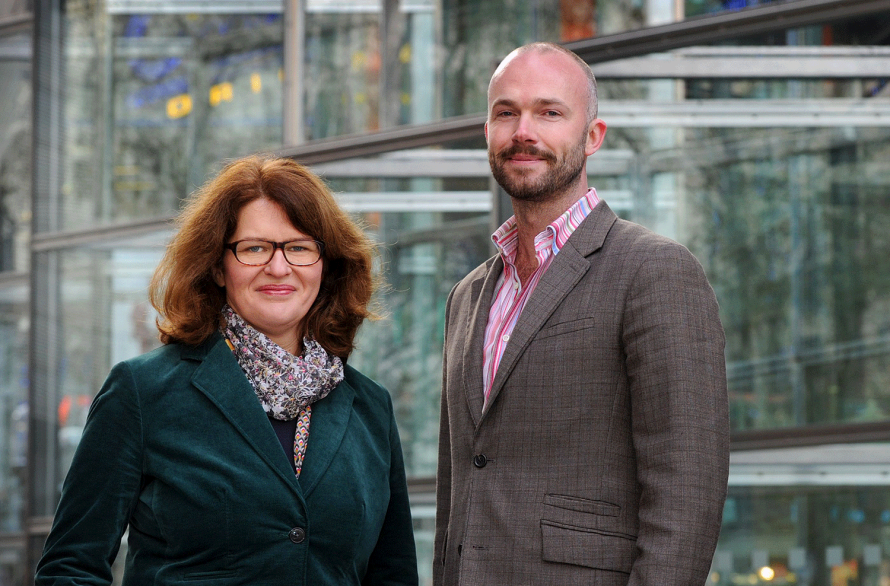
Project manager Christine Tröstrum and programme manager Matthijs Wouter Knol
The thematic focus in 2014 is: "Ready to Play? Breaking the Rules". How will the programme incorporate this theme?
MWK: The theme "play" is at the centre of this year's focus, play in the sense of experimenting. We want to address the questions of how story development can be approached in a playful way, or how to handle the rules of the film industry game, how to learn and modify them, and which circumstances allow for innovation – the theme will be integrated into the programme by many different approaches. "Breaking the Rules" pursues the idea that we want to encourage our participants to not just blindly obey the mechanisms of the business, or emulate that which is currently successful, but to realise their own ideas and question the established rules.
CT: And that's how the focus also emphasises storytelling, so to speak. We want to motivate the participants to play more with the stories, to develop characters in other directions, to just play around with the possibilities available in telling a story. Over the past few years, we often had the impression that many filmmakers work primarily with autobiographical material. That's completely fine as it is, but the course of a story – and with it the development of its characters – often seems to get tied down because of that, and then it's not uncommon that the element of playfulness suffers.
MWK: Storytelling and screenwriting will also be the theme we focus on in the upcoming Summit programme. We're aiming specifically at finding unlike solutions, asking about different and new paths, about possibilities for moving against the current and showing something completely different. We'll have help from some experts who've made a name for themselves doing just that, setting stark and weird elements up against the expected in such a clever way that the films are still comprehensible – pioneers who dared to tell a story this way, successfully yet differently.
With thousands of applicants annually, you always have your finger on the pulse of the new generation of international, aspiring filmmakers. Are digitisation and media convergence constantly creating new trends?
MWK: Sure, you can see a lot of new developments, especially in the area of cross-media. But no matter how a project is conceived or implemented: it's always about touching the viewer with a well-written story. It's about the art of storytelling, something that often simply gets pushed to the background in times of permanent digital innovation and trends towards media convergence. What we want to do is encourage our Talents to avoid letting media-related developments distract them, and concentrate first and foremost on narrating. And that's exactly what should be at the core of Berlinale Talents: delight in telling a story.
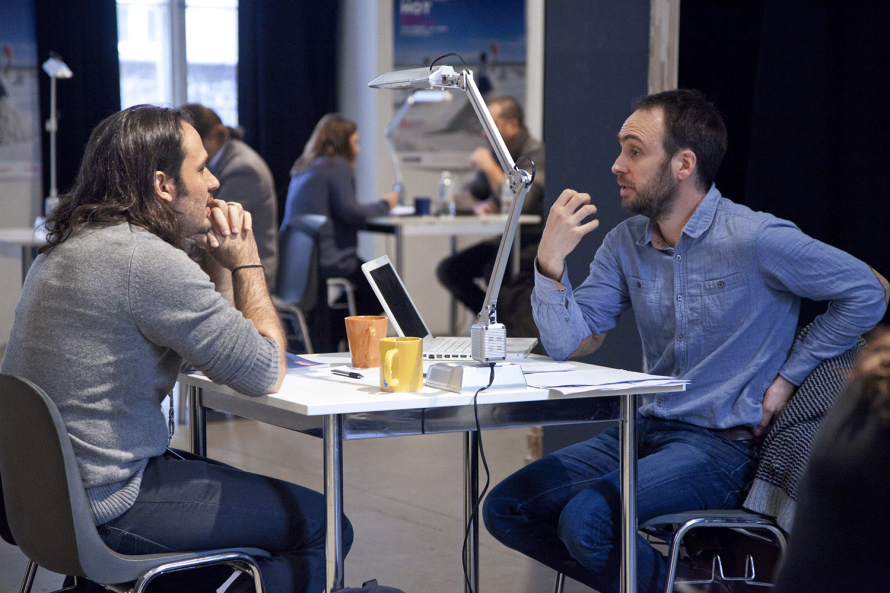
Talents discussing their projects with mentors (2013)
And that doesn't just go for directors and screenwriters?
MWK: Exactly, because the other sections are just as involved in the storytelling. That's why, for example, we'll have an emphasis on visual narration in the workshops and Master Classes on cinematography: how can the camera generate new stimuli in a playful way? There isn't a separate programme for cinematographers, but we do have a number of hands-on modules. For example, Canon – since last year another main partner of Berlinale Talents – is giving the Talents the opportunity to acquaint themselves with various equipment, to try it out and learn how to use it. To enable this we've created the "Play-Box", a touch-and-try area where not just filmmakers and cinematographers can exchange their hands-on experiences, but where Talents can actually work with the equipment themselves. We'll also have the Talents portrait and interview each other – an additional way for us to make the spirit, diversity and personality of the participants visible.
Another new aspect is your closer cooperation with the European Film Market (EFM). What exactly is planned?
CT: Together with the European Film Market, we started a new initiative under the title "Berlinale Talents Market Hub”, which is powered by Canon and enable the coming generation of market participants to present itself with a booth at the film market. Primarily selected Talents from the area of distribution will be there, but the Project Labs participants and their projects will also have a platform.
MWK: Furthermore, we'll also give the Robert Bosch Stiftung / German-Arab Film Prize for International Cooperation award ceremony a stage at Berlinale Talents. With the award, the Robert Bosch Stiftung supports collaborations by up-and-coming producers from Germany and the Arab region, which coincides brilliantly with our goals. So the award ceremony is a great opportunity to learn about the Robert Bosch Stiftung, and especially to meet Talents from the respective regions.